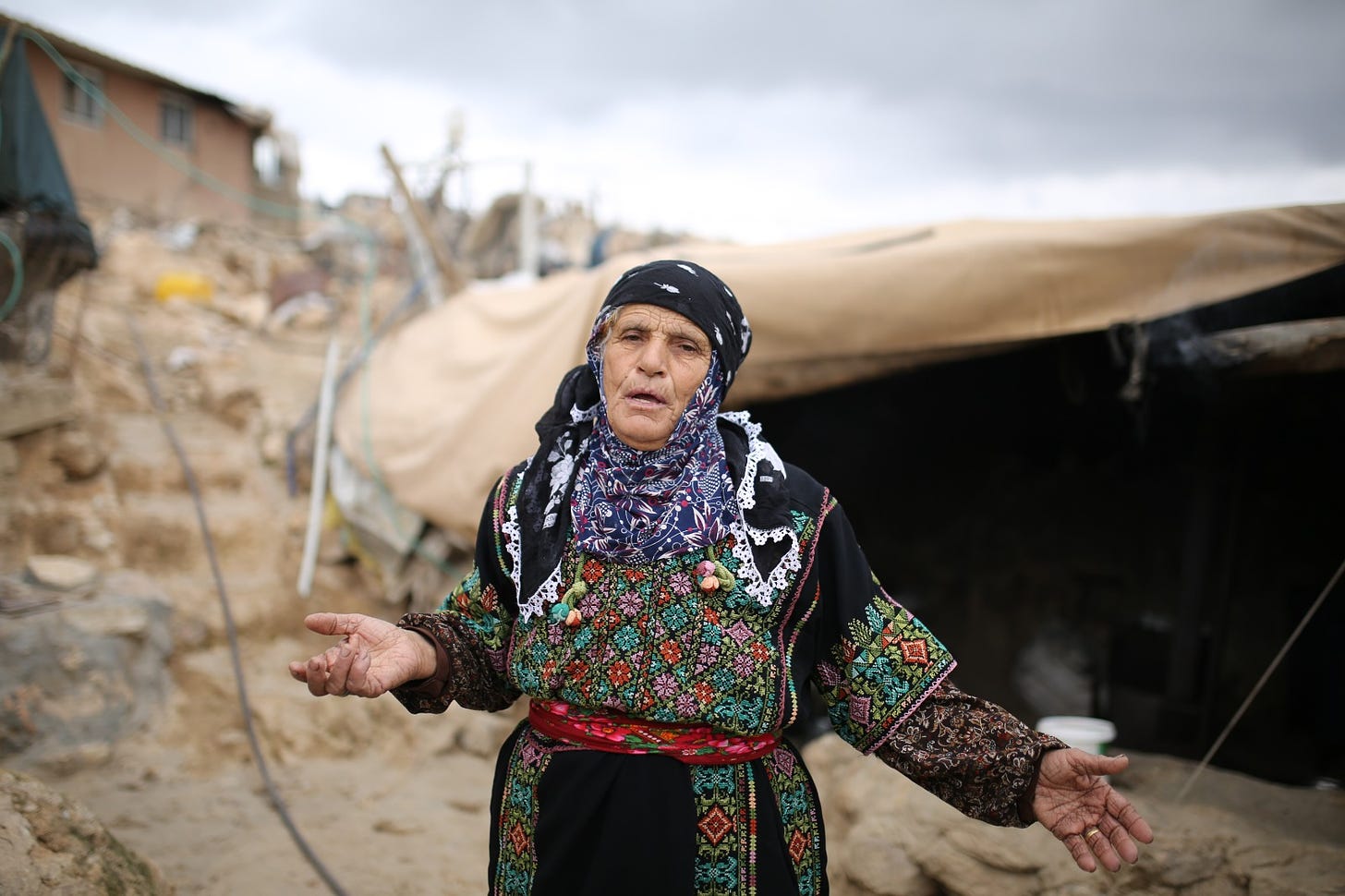Alhalawa village by Hamdan Huraini
The village of Halawa, which is southeast of the city of Yatta, is inhabited by approximately 200
people. These residents rely on livestock breeding and agriculture, and inhabit simple houses of
tents, caves, and small rooms. The village is considered Tarkhia, historical, because of its caves
that are hundreds of years old. It is also among the villages of Masafer Yatta, which suffer from
the practices of the Israeli occupation on a daily basis, especially after the court's decision to
give the green light to the Israeli occupation army to train the military inside their lands and
village.
In this village lives Hajja Sabria Abu Arameho who is more than seventy years old. I met her
and talked to her about the suffering that she both experienced and experiences in her daily life
in the village of Halawa. She has a strong personality, a good memory, and speaks well in terms
of describing her life.
I sat in the cave where Hajja Sabriya lives. From the first glance, it was clear that the cave was
more than 100 years old. Moments after Hajja Sabriya prepared beautiful and wonderful
Palestinian tea, she offered me a cup of tea and sat down. She began to feel more comfortable
with me, so I introduced myself to her and we started talking about her situation in general.
While we were having tea, I asked her about the cave. She looked at me and said, “I got
married in this cave when I was eighteen years old. I am now seventy-three years old. I’ve lived
here in this cave for more than fifty years, but you see my husband is also seventy-three years
old and he was born in this cave. My husband’s father dug this cave. That means that it exceeds
one-hundred years.” She continued, “It means a lot to me. This cave is my home, and my whole
life I have lived in it. I love this. This simple cave for me is a heaven.”
Next, I asked her about what happened when they were displaced from their village in 1999?
She sighed as if she remembered something terrifying and frightening and was silent for a
moment. Then she said, “Listen, my son, that day was the hardest day of my life. When the
Israeli occupation army came to my house and started searching the house and taking the
contents of the house out and I was trying to stop them, but I couldn't…that was the first time
they came, and when they left, one of the soldiers said, ‘You have to leave here, this house is
not yours.’ So I told him to go and said, ‘I was born here and I will never leave my house.’”
A week passed and then they returned, accompanied by large trucks and a large number of
soldiers. “When they reached my house,” Hajja continued, “They started to put all the content of
the house inside the truck, and I tried to stop them but to no avail. They put me and my family
inside the truck and threw us in an area near the village of Umm Al-Khair. There were many
families from Masafer Yatta there that were forcibly deported from their homes.”
“I did not stay there long, and I returned to my house in my village (sweetness). I rode on the
donkey and came back with some things. I returned with my husband and my child, and I stayed
there in my house and woke up early and prepared breakfast for the family. Moments later, the
soldiers came to my house and asked me to leave. I refused and told them this is my house. But
one of the soldiers told me, ‘Go from here or I will kill you and you will leave dead.’ I told him,
‘You can kill me, but you cannot force me to leave my house. I will die here and I will not go.’
He got angry with me and asked the bulldozer to come immediately. He went over to the
bulldozer and asked the driver to dig a big hole. He ordered the soldiers to collect the contents
of the house and put them in the hole. They put everything in the hole and ordered the driver to
put dirt on the items and bury them.
I only said one thing to him, ‘I will not go, do what you want. For here I am like an olive tree
planted in this land, and I will live and die in it. Go from here, come on, you have completed your
work after you destroyed the house, and I will return what you destroyed, O Muharram.’
I continued this as I lived in that bitter period, but we returned and rebuilt and lived happily
despite the Israeli occupation, which punishes all the villages in Masafer Yatta.”
I asked her for her opinion on the Israeli court's new decision to allow the army to train in
Masafer Yatta. She laughed and said, “This is not new. We were born here and we will die here.
We have beautiful and sad memories in it. We will not be able to leave except for our graves,
and we will be buried here in them. This is our destiny, and we do not live far from our home and
we will not be able to die away from it.”
Living in freedom is one of the rights of Palestinians in Masafer Yatta. It is a human right
demand and a fundamental freedom guaranteed by international la
w



